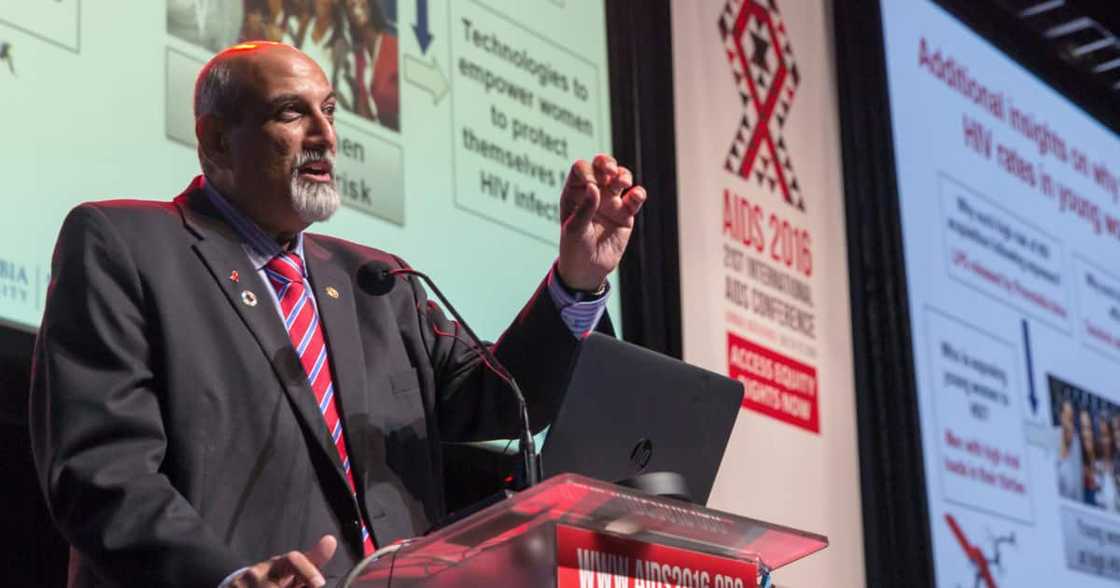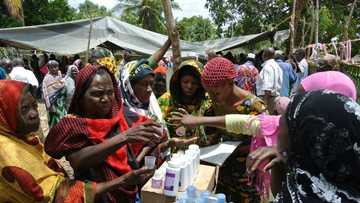Explained: Leading HIV Expert In South Africa, Prof Karim Explains Why There's No HIV Vaccine Yet
South Africa has one of the largest populations of adults currently living with HIV, with approximately 7.8 million infected with the virus. Professor Abdool Karim, who is one of the leading HIV experts in South Africa, speaks to Briefly News about the challenges in creating HIV vaccines.
PAY ATTENTION: Follow Briefly News on Twitter and never miss the hottest topics! Find us at @brieflyza!
In the past two years, the world has been focused on dealing with the Covid-19 pandemic and it seemed like HIV, which is the largest epidemic in the world, took a backseat.
The coronavirus came onto the scene and within months, vaccines were developed which had many people questioning why scientists have not been able to create a vaccine for HIV. Research shows that over 20% of South Africa's adult population is infected with the virus.

Source: Getty Images
Speaking to Briefly News, Professor Salim Abdool Karim, who is the leading expert in HIV research in South Africa, explains why creating an HIV vaccine is taking longer than it did to develop the Covid-19 vaccine.
Why is it difficult to develop an HIV vaccine?
In order to understand why HIV vaccine development is taking so long, Karim explains that we need to understand what HIV really is.
PAY ATTENTION: Follow us on Instagram - get the most important news directly in your favourite app!
According to the Center for Disease Control and Prevention, HIV (human immunodeficiency virus) is a virus that attacks the body’s immune system and if it goes untreated it could develop into Aids (acquired immunodeficiency syndrome).
Karim explains that HIV is not like many viruses that currently exist. He says that through research, they have realised that human beings are unable to naturally clear the virus naturally.
"So unlike, for example, Covid-19, lots of people get infected and they don't even know that they are infected because the body just clears the virus," said Karim.
Karim further states that since the body can clear other viruses like Covid-19, flu or measles, scientists have been able to develop vaccines.
"If you take measles, for example, when you take a vaccine for measles, that vaccine is preparing your body for when the real measles comes and your body will have the protection it needs so you will not get measles," says Karim.
Karim explains that natural measles is a good example because when you get the disease, you only get it once because your body is protected for life after recovery. However, when it comes to HIV, a person can get reinfected with the virus, which is a huge problem.
"So natural HIV does not protect you from getting HIV again. The problem with HIV is that when you get infected, you get a reservoir of cells so your body can't ever clear the infection until you die," explains Karim.
Karim adds that making a vaccine for HIV is very different from making a vaccine for any other virus, explaining that scientists have to take a very different approach.
If people do not understand this information about HIV, they will be left confused by how a Covid-19 vaccine was developed within nine months while the research in HIV vaccines has been ongoing for over 35 years.

Read also
Justin Bieber: What are the symptoms, causes and treatment of the Ramsay Hunt Syndrome affecting US singer
Professor Karim speaks on the current research groups in HIV vaccines in South Africa
Karim says he has been working with two accomplished groups in HIV vaccine research in South Africa. He explains that the first group is led by Professor Carolyn Williamson, who is the head of Medical Virology at the University of Cape Town.
Karim and Williamson are also working alongside Professor Lynn Morris and Professor Penny Moore of the National Institute of Communicable Diseases.
Karim and Williamson have been working together for over 35 years and they have been trying to figure out what element in HIV stays the same. With that knowledge, they believe that they will be able to create a vaccine.
Karim says when they started working on HIV vaccines, they asked what it would take to prevent HIV and what needs to be in the vaccine. Through collaboration with others who developed vaccines, they realised that those vaccines made based on initial theories did not work.
Karim adds that they decided to take a different approach after two groups in the US identified broadly neutralising antibodies. The professor explains that individuals who make these types of antibodies are quite rare.
"They make an antibody that can kill a very wide range of HIV, so we think that that's a better way to try prevent HIV," says Karim.
Karim says they are working on and testing broadly neutralising antibodies and if testing is successful, they will be able to make a new vaccine. He explains that working on these antibodies gives him more hope for the future of HIV vaccination.
"That is one of the reasons I am much more hopeful today than I've been in the past, because these broadly neutralising antibodies look like they can work," exclaimed Karim.
Professor Karim explains some of the challenges he faces in HIV vaccine research
Karim explains that one of the biggest challenges identified was when researchers realised that they can't go against Mother Nature when it comes to HIV. He highlights that since human beings are unable to clear the virus naturally, scientists aren't able to duplicate antibodies that can fight the virus.
Karim also explains that the second challenge is the fact that the virus itself keeps changing, adding that HIV mutates far more rapidly than Sars-Cov-2.
"Even in the same person, the virus is changing all the time. So even if you make antibodies, it does not necessarily mean that you will be able to kill the virus, because it's changing all the time," says Karim.
Karim concludes by saying that broadly neutralising antibodies may be the way to go because they can neutralise a wide range of viruses; however, they are still in the lab testing phase.
Half of men who pay prostitutes may be HIV positive, according to a study
Briefly News previously reported that a new study has revealed that one in 10 men in South Africa pays for sex, and of those, half of them are HIV positive.
The University of Montreal in Canada and Imperial College London commissioned a study that found that men who pay for sex are 50% more likely to be HIV positive.
This has caused concern due to the fact that men who pay for sex are not recognised as a key group and are not prioritised for HIV prevention, according to TimesLIVE.
PAY ATTENTION: check out news exactly for YOU ➡️ find "Recommended for you" block and enjoy!
Source: Briefly News



